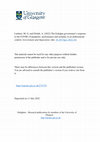Papers by Melis G Laebens
Routledge eBooks, Jan 5, 2023
La actual crisis de la democracia a escala global puede distinguirse de anteriores olas de retroc... more La actual crisis de la democracia a escala global puede distinguirse de anteriores olas de retrocesos democraticos. En la mayoria de los casos, los quiebres provienen de lideres politicos surgidos de elecciones, que intentan concentrar el poder deteriorando los sistemas institucionales, mas que de golpes de Estado tradicionales. Por eso resulta importante pensar una metodologia dinamica para identificar y caracterizar estas «tomas graduales del poder».
Item does not contain fulltextVarieties of Party Identity and Organization (V-Party

Government and Opposition
This article analyses the Erdoğan government's policy response to the coronavirus pandemic. D... more This article analyses the Erdoğan government's policy response to the coronavirus pandemic. Despite the abundant use of moral antagonisms in his discourse, Erdoğan did not attempt to politicize the pandemic, instead framing it as a global health crisis and presenting the government's public health policies as expert-driven and competent. However, this expert-driven approach was largely a performance. Without a system of democratic oversight or a free media to scrutinize government policies, the Erdoğan government could systematically undercount COVID-19 cases and disregard its own public health restrictions, all the while spreading its narrative of competence and success. Competitive policymaking by opposition-controlled municipalities and criticism from a strong doctors' association had relatively limited ability to discredit the government. The public opinion data we present reveal broad-based support for the government's COVID policies. Our article highlights how ...

The Oxford Handbook of Turkish Politics, 2020
This chapter first describes the main features of contemporary party organizations in Turkey, foc... more This chapter first describes the main features of contemporary party organizations in Turkey, focusing on five salient topics: a) leaders’ control over parties, b) political patronage and clientelism, c) the organization of mass participation, d) profiles of political elites, and e) party financing. The discussion highlights variation across parties due to different ideologies and organizational legacies. Two questions that motivate many studies of Turkey’s parties are then discussed in greater depth: Why are party leaders so dominant in party organizations? What are the consequences for democracy of leaders’ extensive control over the organizations? The chapter highlights the role of the 1980 military intervention in aggravating leadership domination in centrist parties, and argues that leadership domination contributed to the party system crisis of the late 1990s, as well as to the recent breakdown of democracy. Currently, the authoritarian and presidential institutional framework...
Supplemental material, Online_Appendix for Partisanship and Autocratization: Polarization, Power ... more Supplemental material, Online_Appendix for Partisanship and Autocratization: Polarization, Power Asymmetry, and Partisan Social Identities in Turkey by Melis G. Laebens and Aykut Öztürk in Comparative Political Studies

Comparative Political Studies
Although theories of partisanship were developed for the democratic context, partisanship can be ... more Although theories of partisanship were developed for the democratic context, partisanship can be important in electoral autocracies as well. We use survey data to analyze partisanship in an electoral autocracy, Turkey, and find that partisanship is pervasive, strong, and consequential. Using the Partisan Identity Scale to measure partisanship, we show that, like in democracies, partisanship strength is associated with political attitudes and action. Unlike in democracies, however, the ruling party’s superior ability to mobilize supporters through clientelistic linkages makes the association between partisanship and political action weaker for ruling party partisans. We find that partisan identities are tightly connected to the perception that other parties may threaten one’s well-being, and that such fears are widespread on both sides of the political divide. We interpret our findings in light of the autocratization process Turkey went through. Our contribution highlights the potent...

This chapter first describes the main features of contemporary party organizations in Turkey, foc... more This chapter first describes the main features of contemporary party organizations in Turkey, focusing on five salient topics: a) leaders’ control over parties, b) political patronage and clientelism, c) the organization of mass participation, d) profiles of political elites, and e) party financing. The discussion highlights variation across parties due to different ideologies and organizational legacies. Two questions that motivate many studies of Turkey’s parties are then discussed in greater depth: Why are party leaders so dominant in party organizations? What are the consequences for democracy of leaders’ extensive control over the organizations? The chapter highlights the role of the 1980 military intervention in aggravating leadership domination in centrist parties, and argues that leadership domination contributed to the party system crisis of the late 1990s, as well as to the recent breakdown of democracy. Currently, the authoritarian and presidential institutional framework creates a new environment for political parties and may cause historically unprecedented transformations in party organizations, both positive and negative.
Nueva Sociedad, 2019
La actual crisis de la democracia a escala global puede distinguirse de anteriores olas de retroc... more La actual crisis de la democracia a escala global puede distinguirse de anteriores olas de retrocesos democráticos. En la mayoría de los casos, los quiebres provienen de líderes políticos surgidos de elecciones, que intentan concentrar el poder deteriorando los sistemas institucionales, más que de golpes de Estado tradicionales. Por eso resulta importante pensar una metodología dinámica para identificar y caracterizar estas «tomas graduales del poder».











Uploads
Papers by Melis G Laebens